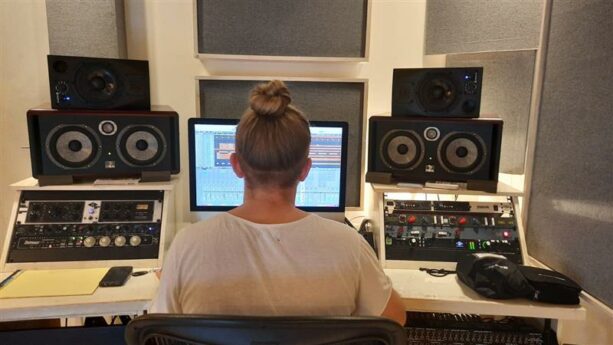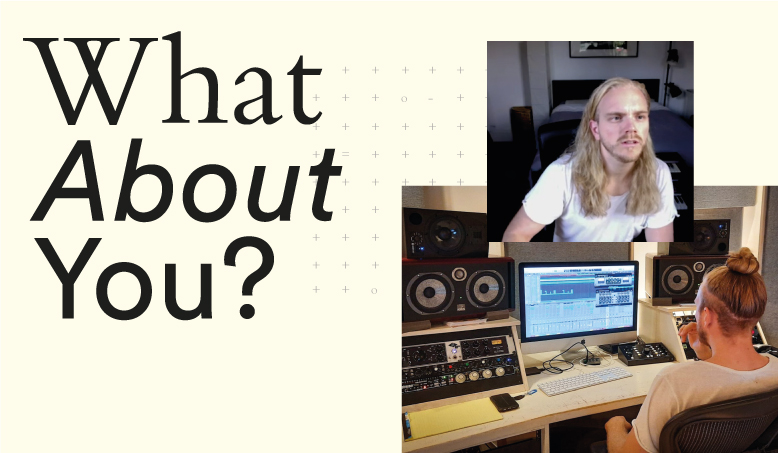As we explore new ways to bring the spirit of our school to life, to bring our students together, and inspire new members, Hult teamed up with Swiss-born, London-based artist COTTON to create a song that captures what Hult is all about. “What About You?” is now available to stream and download on Spotify, Apple Music, and all major music providers. Before the release, we caught up with COTTON to talk about the influences for the piece, the creative process, and the magic of collaboration.
Hult: Let’s start with you, how did you get into the music business?
COTTON: I started music when I was very young, about eight. I started trumpet and then I did guitar, I taught myself piano, and I did a lot of vocal coaching. I came to London from Switzerland about seven years ago for my studies. I did a higher diploma in guitar performance, a bachelors in song writing and arrangement, and then I did my masters in record production—part time, to be able to work on projects on the side.
So I sort of went from the musician side, the writing and how songs are built, to eventually the technical side of things; how to deal with recording in a studio and what sort of processing you have to play with to really make it as good as it can be. Now, I’m able to step back and be like: ok, how am going to approach this? Sounds, lyrics, samples—there’s so many ways now for me to approach the same problem that it’s just up to me how I want to do it. It’s so empowering, that freedom.
H: How did you approach creating the Hult song?
C: With Hult, I started with the music. At first we weren’t sure if there were going to be lyrics, so it was more an energy, a certain vibe. I knew there needed to be a diversity of sound and I ended up using different instruments—so I took a koto, which is sort of like a Japanese guitar; I took a tabla, which is very grounded in Indian culture; I took some R&B, jazzy chords, that’s more American influence; others are very Afrobeat, tam tams, things like that. I was trying to get that international representation in the sounds.
Giving each instrument their moment, it’s like allowing a certain culture to speak at one time.
H: So you used different instruments to represent the diversity of our students?
C: Giving each instrument their moment, it’s like allowing a certain culture to speak at one time. Like, ok, off you go, tell me something, and then someone else has the right to speak and to express themselves. Finding the balance in that is what I personally love. It’s really a joy because you have so much to play with.
There’s so much music out there that is amazing, there are so many people saying such interesting things. You just try and understand their meaning and be like, ok, this all fits together in this way. It’s like the most complicated puzzle you can ever play with. And it’s never-ending really. It comes with new sets of pieces all the time, and you’re just like: brilliant, what’s it going to be today?


H: What about the lyrics? How did those develop?
C: We started with a question. I thought this was really an interesting concept, to say something by questioning. So you’re not saying, “Let’s dance and have a good time”, you’re not saying, “I will discover the world and travel everywhere”, you’re saying: “I participate in this way, what do you do? What about you?”. You’re having a conversation. There’s space for the listener to reflect, to ask themselves, “What am I doing? Maybe I could do more. Maybe if I challenge myself in a certain direction, that will help me.”
The song talks about over-achievers, people who are very dedicated, and it talks about the readers, the leaders, and the dreamers. There’s so many ways to be amazing. So it’s only a matter of framing this so that everyone will be able to relate. The chorus goes:
“Look out for the leaders on the boulevard, watch out for the readers in the courtyard…Stand up for the heralds in the avant-guard. Heads up, ’cause the rebels got the best cards.”
It puts people in different circumstances and environments, it’s inclusive. I thought that was a great emotion to share as an institution, that you’re inclusive. That you take all different kinds of students from different backgrounds, from different countries, different cities, different everything, and you give them the same drive, you give them the same push. You give them the same faith in themselves, to help them achieve the world.
The verse is really a call for challenging yourself. It’s a call for achievement and greatness.
Then the hook, “What about you?”, this is even more inclusive. You’re really bringing it back to the person. You’re showing the examples, saying: this is what can inspire you, but at the end of the day, it’s about you. The verse is really a call for challenging yourself. It’s a call for achievement and greatness. It says:
“Greatness might be right around here. Glad you find the strength to stand. Maybe there’s no right or wrong way to go, seems your fate is all in your hand.”
It’s all about defining yourself, taking that energy and applying it for yourself—your fate is in your hands.
H: We loved working with you and we know you do a lot of collaborations. How do you find the teamwork aspect of what you do?
C: It’s one of the main reasons I do it. The way other people do their jobs and how they approach their craft is going to change how I react and the way that I support them. The energy of the output is always so different but it’s all valuable, it’s all amazing. I mean, it’s not all amazing music! But the process is always great because it’s genuine contact with people.
For me, the human aspect is huge. You just pick the harvest at the end and you get a basket of very uneven looking fruits and you’re like, sweet, I’m going to make this amazing pie with it.
Every input is worth taking—not always keeping—but taking.
I’m very much the kind of dude to have a dinner and have all my friends come in and I’ll just cook for everyone. Just because having everyone over is lovely. Just having all my mates in one room, eating my risotto, it’s so great.
Once you’ve accepted that every input is worth taking—not always keeping, but taking—someone can come up to the pot and be like: “You know, I would put a bit more pepper in this, I think it will taste nicer.” And so I put in a bit more, taste it, and I’m like: “He was actually right you know, pepper was a bit low, fair enough.” Making music is exactly like this. For me, music is another platform where I can bring people together.
Listen to Hult’s new release, “What About You?”, featuring COTTON now on Spotify, Apple Music, and all major music providers.


